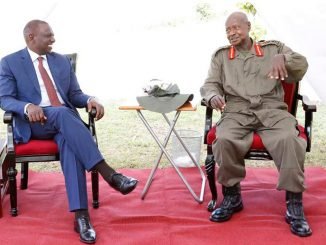
Kampala, Uganda | URN | A week after the shooting of the late Ibrahim Abiriga, the former Arua Municipality Member of Parliament in June last year, President Yoweri Museveni addressed Parliament about the state of security in the country.
At the time, the country was grappling with a number of other violent crimes including armed robberies, kidnaps and murders. In his speech, Mr Museveni laid down a 10-point security plan to combat crime.
President Museveni argued that once implemented, the security plan would wipe out crime across the country.
The security measures included the installation of Closed Circuit Television (CCTV) cameras in urban areas and highways, use of police radio calls, recruitment of Local Defence Unit (LDU) personnel, introducing electronic number plates for motor vehicles and motorcycles and cleaning wrong elements he referred to as bean weevils from police.
Other measures included finger printing of all guns both government and private, as well individual, prioritizing public intelligence, regulating social media, banning motorcyclists from wearing hoods and use of drones. As 2019 nears its end, this publication reflects on what has been achieved this year in regards to the security plan.
CCTV cameras
Between April and November this year, government installed CCTV cameras, finger printed fire arms across the country and deploy LDUs. Museveni commissioned the National CCTV and Security Commander Center at Naguru police headquarters fortnight ago.
At least 3,000 CCTV cameras have been installed in Kampala, Wakiso and Mukono districts. CCTV control centers have been established in the 18 policing divisions under Kampala Metropolitan area. More than 300 suspected criminals including the killers of social work, Maria Nagirinya were arrested with the help of CCTV cameras.
Read Also: First year of CCTV cameras in fighting crime, traffic violations in Kampala
In his speech, Museveni said with the CCTVs in place, criminals will to suffer as cameras are in position to capture their activities in places from as far as 30kms. He said government will install cameras on highways and start the digital registration of motor vehicle and motorcycle number plates in the second phase.
Gun Finger Printing
About a fortnight ago, Police Spokesperson, Fred Enanga informed journalists that 57,000 guns had been registered across the country by the gun finger printing committee chaired by Assistant Inspector General of Police (AIGP), Edward Ochom. They include guns from Uganda Police, Uganda Prisons, Private Security Organisations –PSOs and individuals.
Guns in hands of Uganda People’s Defense Forces (UPDF), Special Forces Command (SFC) and Chieftaincy of Military Intelligence (CMI) have also been finger printed. Enanga warned private security firms and individuals whose guns will not be registered by end of this month that they risk losing their licenses.
LDUs Deployment
In April, UPDF deployed more than 6,000 LDUs in Kampala, Wakiso and Mukono district. Lt. Gen Peter Elwelu, the Commander of UPDF Land Forces and Deputy Inspector General of Police –Maj Gen Stephen Muzeyi Sabiiti, said LDUs are doing a great job in their areas of operation despite the prevalent crime.
Gen Elwelu said they have actually arrested more than 2000 suspected criminals since the LDUs were deployed and blamed court for releasing the suspects on bail.
Maj. Gen Sabiiti said there an ongoing process to fully incorporate the LDUs in police operations. He said the presence of LDUs in fighting crime will be felt once they are fully integrated in police operations.
However, there have been several complaints on the conduct of the LDUs since their deployment. The complaints range from torture, extortion and misuse of their firearms.
At least seven people including a UPDF commander have been killed by LDUs during their operations.



